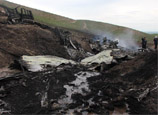
The concern over the worsening pollution in Chinese cities has become a part of the national discourse and debate. It’s been serious enough to have the government introduce far-reaching policy changes to tackle the problem.
A clear sunny day in Beijing.
A sight Beijingers often struggle to see when faced with overbearing pollution. Pollution many say, is caused by polluting industries around the capital.
The kind of industries that are now visible on a map. And an interactive digital one at that.
It’s the brainchild of China’s pre-eminent environmentalist Ma Jun; for whom it’s a personal and professional mission to create a better environment.
Named one of the World’s 100 most influential people by Time magazine in 2006, his use of social technology as a force for change is impressive.
Ma said, "We hope to present some of the largest polluting sources in China to the public. Recently, the development of IT technology, and also the smart phone technology and social media like Weibo, allows us to take advantage of that. So we designed a program, if people can take a picture of the company on the list disclosed by the ministry, and then upload that on the Weibo.We can locate them, pinpoint them on the digital map.”
Ma Jun says the national pollution map database that he has created is aimed at getting people informed and involved. It’s raising the public profile of the disclosure of pollution data and putting pressure on major companies to make their supply chains more environmentally sound. Public scrutiny, backed by hard evidence and records have proven effective.
In 2011, with the help of a fisherman, Ma Jun found toxic waste dumped by a factory in Wuhan. The hazardous emission posed a threat to the lives of local people.
As an independent authority, Ma Jun took sample tests, that showed the water was seriously contaminated with heavy metals.
One year on, the factory has taken major corrective action to fix the problem. It has re-laid the pipe above ground, from its earlier location under-ground. In the process, toxic leakage into the ground water table has been stopped.
CCTV reporter Su Yuting said, "as a leading environmentalist, Ma Jun believes that the Chinese government can tackle environmental pollution by raising public awareness and participation. Information transparency, public motivation and law enforcement are all ways the Chinese government can help protect the environment and achieve a green and beautiful China. "
The Ministry of Environmental Protection has been making efforts in the battle against pollution. The construction of a network for real-time monitoring of air quality was accelerated and the data made available to the public. In one of the toughest measures on record, the government made it mandatory for major polluting industries in 47 cities to come up to international standards of pollution control.
Progress has been made. But polluted rivers and other environmental hazards still remain.
Ma Jun says the core reason for that is lack of awareness of and effective measures against pollution in China’s decades of rapid industrialization and urbanization.
"Now, we are too much dependent on the heavy polluting industries, so we need to restructure our economy, with that, we can change the growth model, " he said.
Ma Jun is not alone when he hopes for a cleaner and healthier environment for future generations. It may appear difficult seeing the level of pollution around, but sincere governmental action and public participation in the process, could be the key to making the seemingly impossible, a reality.
















 In pictures: Henan construction site collapse kills 7
In pictures: Henan construction site collapse kills 7


![]()
